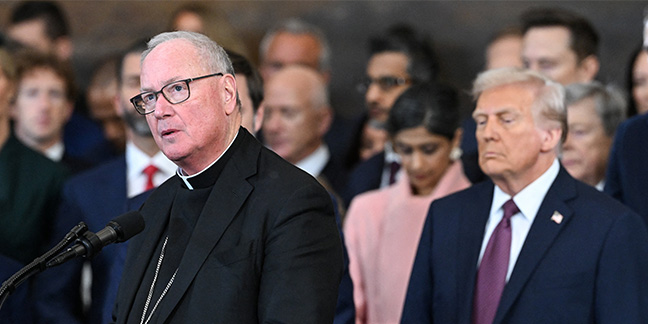 New York Cardinal Timothy M. Dolan delivers the invocation during U.S. President Donald Trump's swearing-in as the 47th U.S. president in the U.S. Capitol Rotunda in Washington Jan. 20, 2025. (OSV News photo/Saul Loeb, pool via ReutersReuters) WASHINGTON, D.C. — Donald Trump was sworn in for a second, nonconsecutive term in the White House Jan. 20, becoming the nation's 47th president four years after he left office as its 45th.
New York Cardinal Timothy M. Dolan delivers the invocation during U.S. President Donald Trump's swearing-in as the 47th U.S. president in the U.S. Capitol Rotunda in Washington Jan. 20, 2025. (OSV News photo/Saul Loeb, pool via ReutersReuters) WASHINGTON, D.C. — Donald Trump was sworn in for a second, nonconsecutive term in the White House Jan. 20, becoming the nation's 47th president four years after he left office as its 45th.
In an oath administered by Chief Justice John Roberts, Trump pledged to "preserve, protect and defend" the Constitution, as that document requires.
JD Vance, previously Ohio's senator, also took the oath of office, becoming the nation's second Catholic vice president. Justice Brett Kavanaugh administered his oath.
His inauguration ceremony was moved indoors amid frigid temperatures in the nation's capital, taking place in the Capitol Rotunda rather than the exterior West Front of the Capitol Building.
An opening prayer was delivered by Cardinal Timothy M. Dolan of New York, who cited the Rev. Dr. Martin Luther King, whose federal holiday was also observed Jan. 20, "who warned without God our efforts turned to ashes."
The cardinal prayed that Trump "may know your designs," and also wished God's blessings on President Joe Biden in the final moments of his term.
Cardinal Dolan spoke alongside Franklin Graham, son of the late Billy Graham.
Prior to the ceremony, Presidents Trump and Biden met at the White House, marking the first time in generations a president had the same predecessor and successor. Only one president, Grover Cleveland, has previously served nonconsecutive terms in the White House. Others, including Martin Van Buren, tried and failed to return to the White House.
But the meeting was also something of a return to precedent, after Trump refused to meet with Biden or attend his inauguration four years ago. Trump's action was taken amid his unfounded claims that the 2020 election was stolen from him, and in the aftermath of the Jan. 6, 2021, riot at the U.S. Capitol building -- the day 2,000 supporters of then-President Donald Trump attempted to block Congress' certification of President Joe Biden's election victory.
But despite the cordial public greeting, the tension between the two men could be seen in one of Biden's final actions in his closing hours as president. Biden issued preemptive pardons for some individuals Trump has threatened to prosecute: Dr. Anthony Fauci, former director of the National Institute of Allergy and Infectious Diseases; retired Gen. Mark Milley, former chairman of the Joint Chiefs of Staff; and the lawmakers and staffers from the House committee that investigated the events of Jan. 6 including former GOP Reps. Liz Cheney of Wyoming and Adam Kinzinger of Illinois, as well as Sen. Adam Schiff, D-Calif.
"The issuance of these pardons should not be mistaken as an acknowledgment that any individual engaged in any wrongdoing, nor should acceptance be misconstrued as an admission of guilt for any offense," Biden said in a statement. "Our nation owes these public servants a debt of gratitude for their tireless commitment to our country."
In a message to Trump, Pope Francis expressed "the assurance of my prayers that Almighty God will grant you wisdom, strength, and protection in the exercise of your high duties."
"Inspired by your nation’s ideals of being a land of opportunity and welcome for all, it is my hope that under your leadership the American people will prosper and always strive to build a more just society, where there is no room for hatred, discrimination or exclusion," Pope Francis said, adding, "I also ask God to guide your efforts in promoting peace and reconciliation among peoples."
— Kate Scanlon, OSV News


